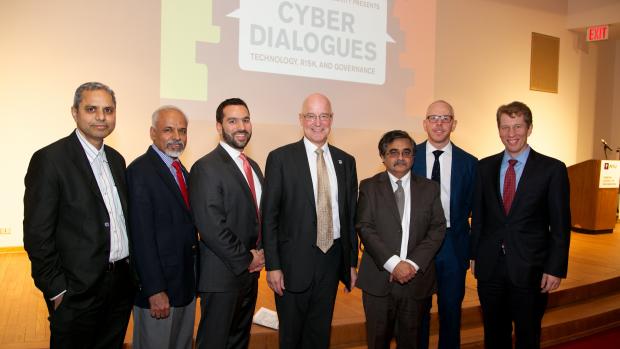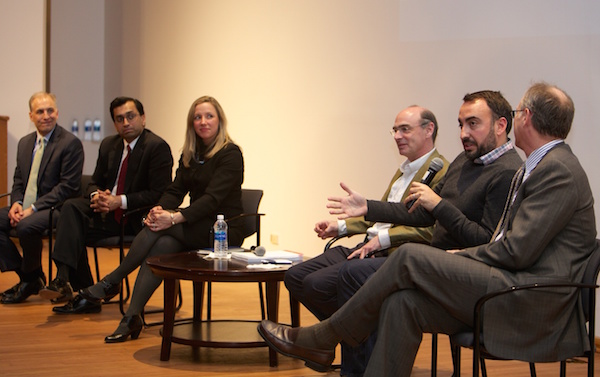A New Center and New Solutions
Collaborative Center for Cyber Security Launches

With digital data now essential to almost every facet of our lives, from our personal finances and healthcare to our jobs, cyber security is becoming ever more crucial and has evolved into a multidisciplinary field that requires cooperation among computer scientists, psychologists, law-enforcement personnel, economists, policy makers, and others.
NYU—long at the forefront of that multidisciplinary approach—is now the home of the Center for Cyber Security (CCS), a collaboration between the Tandon School of Engineering; NYU School of Law; Steinhardt School of Culture, Education, and Human Development; and other NYU schools and departments. (The new research center—which has physical locations in New York and Abu Dhabi as well as a network of scholars and practitioners in Europe, Asia, and the Middle East, among other locales—had a precursor in the university’s Center for Interdisciplinary Studies in Security and Privacy.)
To celebrate the launch of the CCS, Tandon hosted “Cyber Dialogues: Technology, Risk, and Governance,” which brought several industry leaders and academicians to Brooklyn to speak about the high stakes for companies and institutions. Opening the event, Dean Katepalli Sreenivasan reminded the audience that the CCS represented just the sort of collaborative venture he hoped would result from the 2014 merger of the Polytechnic School of Engineering and New York University. “In fact,” he said, “my expectations have already been exceeded, and I’m sure there with be many more such collaborations in the future.” NYU President Andrew Hamilton told the audience: “At NYU our whole is greater than our parts, as the formation of the CCS shows.”
The event took the form of lively conversations between sets of participants, with Alex Stamos, Facebook’s chief security officer, interacting with Judith Germano, senior fellow at the NYU Center on Law and Security ; NYU Center on Law and Security Distinguished Fellow Rajesh De, a partner at Mayer Brown and former general counsel with the National Security Agency, speaking with Ted Schlein, a partner at the investment firm Kleiner Perkins Caufield & Byers; and NYU Center on Law and Security Distinguished Fellow Randal Milch, a former executive vice president and general counsel of Verizon Communications, pairing with Matthew Olsen, who heads the security consulting firm IronNet and is a former director of the National Counterterrorism Center.
 Speakers advocated on a range of topics, from the need to shorten the time between detecting a threat and disarming it, the inadvisability of a cyber-arms race, and the importance of sharing threat information with other possible targets. Among the hottest issues brought up during the evening was the government’s suit that seeks to require Apple to unlock an encrypted iPhone.
Speakers advocated on a range of topics, from the need to shorten the time between detecting a threat and disarming it, the inadvisability of a cyber-arms race, and the importance of sharing threat information with other possible targets. Among the hottest issues brought up during the evening was the government’s suit that seeks to require Apple to unlock an encrypted iPhone.
“My job is to protect the personal data of over 1.6 billion people,” Facebook’s Stamos said. “I need a lot of tools to do that, and one of the most powerful tools we have is encryption. . . When you start to force companies to intentionally create vulnerabilities in their products—that is a slippery slope that we will never be able to unwind.” (Facebook has joined several other tech companies in publically supporting Apple.) He continued, “It doesn’t have to stop with phones, it can move on to all kinds of technology. So the idea that we can go down this path and only use it for terrorism and only use it in the United States is clearly completely false.”
Nasir Memon, head of Tandon’s Department of Computer Science and Engineering and a co-founder of the CCS, explained that more such issues are bound to arise and that centers like the CCS will be at the forefront of dealing with them. “Cyberspace has no geographic boundaries and it hosts a mix of ideologies and beliefs,” he said. “The laws and institutions on which we traditionally count don’t exist there, so mechanical solutions alone are not going to suffice.”
Watch the full CCS Cyber Dialogues below:

